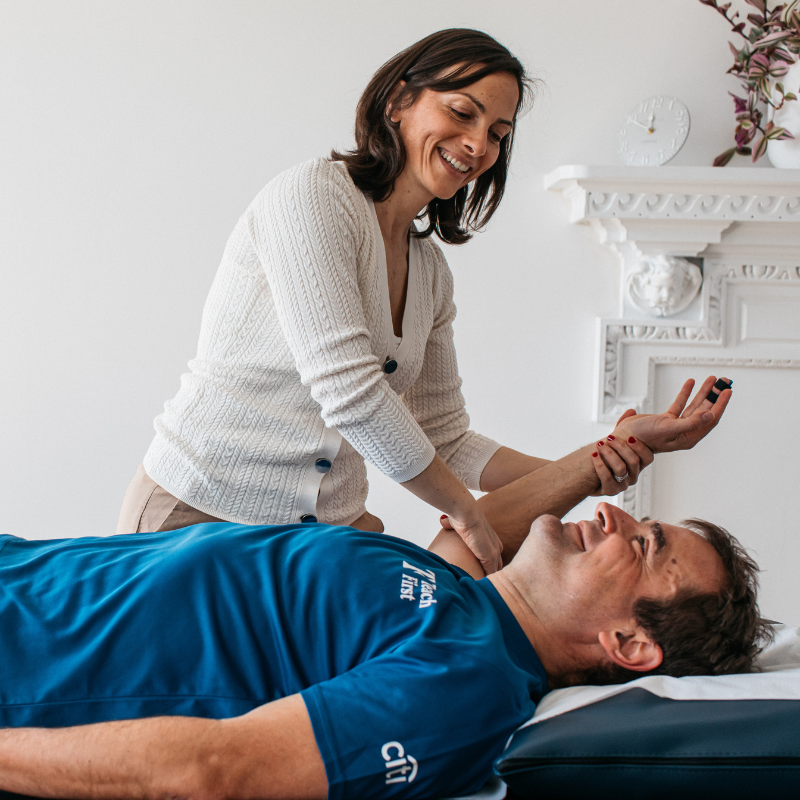Referred Shoulder Pain
Referred shoulder pain is challenging and sometimes complex. Understanding the cause of your pain is crucial to achieving the best results. Referred shoulder pain is common and can be confusing, as other areas (such as your neck or your spine) can produce pain in your shoulder region. Also, your lungs, diaphragm, heart, liver or gallbladder. Therefore, it is critical to identify the cause of your shoulder pain to get the best results. In the article below, we address frequently asked questions and explain how an osteopath at Wellthy Clinic would diagnose and treat shoulder pain.
How Do I Know if My Shoulder Pain is Referred?
If your pain is not reproduced with shoulder movements, it is likely to be a referred pain. Generally referred pain is a constant pain that is not worse with specific movements. The nature of the pain is usually dull and achy, as opposed to a shooting pain sensation. If your shoulder pain is present all the time (not intermittent) or if you have had it for over one month, then you should see a healthcare practitioner.
How do you Investigate Shoulder Pain?
At Wellthy Clinic, our Osteopaths take a case history to establish a timeline, exclude red flags and help understand the cause of your shoulder pain. A postural assessment and physical examination will then be conducted, including active shoulder, neck, and back movements. After this, your shoulder, neck and spine joint movements will be assessed passively. Active resisted muscle testing and orthopaedic testing could also be performed to diagnose your shoulder pain. We see shoulders within context, and sometimes it’s osteopathy for neck pain, osteopath for hip pain or even osteopath for knee pain that could be causing increased mechanical loading to happen through your shoulder.
Is my Shoulder Pain Coming From my Neck?
If your pain is made worse with your neck (not your shoulder) movements, then more than likely, yes. However, this can be confusing as people with neck-related shoulder pain can also experience muscular weakness in the shoulder region. Pain that originates from your neck and radiates to your shoulder is typically dull and achy. Generally, it’s your cervical spine joints or ligaments. If the pain is shooting or feels like pins and needles into the upper arm and/or hand, then it is likely to be a pinched nerve. Cervical spondylosis, spinal stenosis, cervical disc prolapses, ligament and muscle injuries are all possible differential diagnoses. Therefore, seeing an experienced practitioner who can understand the cause of your pains and treat either your shoulder, neck and spine, or all of the above is all important.
Osteopath for Referred Shoulder Pain
Best Osteopath in Central London, find the best results are achieved when we provide hands-on treatment for the whole posture (not just your shoulder). Your Sports Osteopath in London will treat you using muscular stretching, joint articulation, and manipulations (if appropriate techniques). They may also offer Cranial Osteopathy techniques, which are a gentle yet effective treatment for the shoulders. Pilates rehab exercises to increase your shoulder and upper back mobility and strength will be encouraged. Musculoskeletal health nutritional advice might be suggested to optimise your recovery, especially for clients with diabetes, as there is a higher prevalence rate, as insulin fluctuations greatly affect your shoulder tendons and ligaments.
If you are unsure if it’s referred shoulder pain, you can call our London Osteopath Clinic in Marylebone.
Other Conditions for Referred Shoulder Pain
What does Shoulder Pain from the Gallbladder Feel Like?
Typically, you will experience a dull, achy, nagging referred right shoulder pain, which is worse after consuming fatty foods. You may also experience intermittent bloating and abdominal pain. Your shoulder pain is unlikely to feel worse with actual shoulder movements.
What Causes Shoulder Pain from the Gallbladder?
Addressing the cause of your right shoulder pain by reducing inflammation within your gallbladder. Investigate whether you have gallstones and, if so, what sizes. Speak to your GP as you may require a scan of your gallbladder. Either way, changing your diet to reduce inflammation within your body by eliminating foods high in saturated fat, such as meat pies, sausages, fatty cuts of meat, butter, cream, cheese, cakes, and biscuits, is a good starting point. Having a well-balanced diet that includes fruit and vegetables to give your body the right nutrients and optimise your absorption. Our nutritionist at Wellthy Clinic will be able to advise you and create a personalised nutritional plan to help you achieve the best results.
What does Shoulder Pain from the Liver Feel Like?
Usually, it feels like a dull, throbbing sensation in your right shoulder and sometimes your spine. You may also experience pain in your right abdomen, which can be like a stabbing sensation.
What are the First Signs of a Bad Liver?
Initially, symptoms could include feeling unwell and constantly tired, loss of appetite, weight loss, muscle wasting and vomiting. You could feel pain in your right abdominal region (above your liver). Poor sleep and blotchy red palms are signs of liver disease (cirrhosis). As the disease progresses, there are numerous other symptoms, including right shoulder pain. If you experience severe symptoms such as shortness of breath, vomiting blood, a high temperature, dark or black stools, or confusion, you should see a doctor straight away (British Liver Trust).
What Foods are Good for Liver Repair?
Vegetables, especially leafy greens and broccoli, garlic, fish, nuts and healthy oils.
How do you Heal Your Liver?
Addressing your hydration and nutrition by having a well-balanced diet and drinking plenty of water. Initially, eliminate alcohol, fizzy drinks, fatty animal proteins, refined sugars, processed foods and saturated fats for 6 weeks. Include lots of vegetables, especially leafy green vegetables and broccoli. Drink green tea as it’s high in antioxidants. Eat foods high in omega-3 fatty acids, such as fish, nuts, and healthy oils (olive oil). Increase exercise, but this depends on how you are feeling. Book a consultation with our nutritionist to gain a personalised plan to support your liver recovery and achieve the best results.
Frequently Asked Questions
What causes referred pain to the shoulder? Referred shoulder pain occurs when a problem in another area of the body, such as the neck, diaphragm, heart, or abdomen, sends pain signals to the shoulder. This is due to overlapping nerve pathways in the spinal cord.
What organ refers pain to the right shoulder? The liver and gallbladder can refer pain to the right shoulder, especially when inflamed or obstructed. This happens through irritation of the phrenic nerve, which shares cervical nerve roots with the shoulder.
What organ refers pain to the left shoulder? The heart, particularly during a heart attack or pericarditis, can refer pain to the left shoulder. The spleen and pancreas may also contribute if inflamed or ruptured.
How do I know if my shoulder pain is due to a muscle or joint issue? Muscle pain tends to worsen with movement or pressure and feels more diffuse or aching. Joint pain is often sharper, more localised, and can limit range of motion or feel stiff.
Can shoulder pain be a symptom of heart problems? Yes, especially if it’s left-sided, sudden, and accompanied by chest pain, nausea, or shortness of breath. This may indicate a cardiac event and should be treated as a medical emergency.
How do you know if right shoulder pain is liver-related? Liver-related shoulder pain may occur in conjunction with upper abdominal discomfort, jaundice, or fatigue, particularly after consuming fatty foods. Imaging and liver function tests can help confirm the diagnosis.
Can bowel problems cause shoulder pain? Yes, especially in cases of intestinal perforation, inflammation, or gas under the diaphragm, which can irritate the phrenic nerve and refer pain to the shoulder. Abdominal symptoms often accompany it.
What organ causes pain in the left shoulder blade? Pain under the left shoulder blade can be referred from the heart, stomach, or pancreas. It’s important to assess for accompanying symptoms such as chest discomfort or digestive issues.
How do I get instant relief from shoulder pain? Resting the shoulder and taking over-the-counter anti-inflammatory medication may provide short-term relief. However, if the pain is referred, addressing the underlying cause is crucial.
Eleonora is our Clinic Director, an Osteopath, Cranial Osteopath, Nutritional therapist & Pilates Instructor. She believes a combined approach gains the best results for referred shoulder pain.




